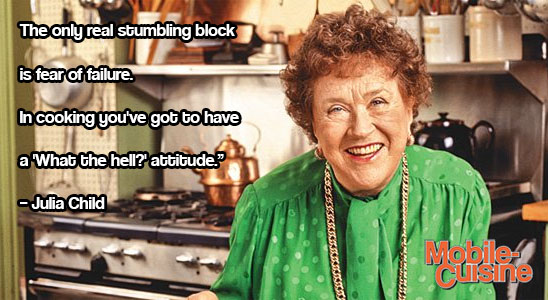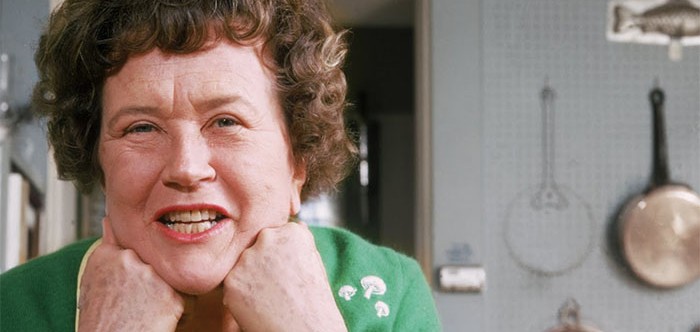Today marks the 9 year anniversary of the loss of a true trail blazer in the culinary world. On August 13th, 2004 Julia Child passed away just 2 days before her 92nd birthday. To mark this day, we are re-publishing an article we shared last year.
My Life in France chronicles Julia Child’s life from the year she arrived in France in 1948, knowing nothing about the French culture or language, nor the cuisine she would so famously present to to America in her ground-breaking cookbook, Mastering the Art of French Cooking, and her television show, The French Chef.
What does any of that have to do with your food truck business? One of the things that stood out about Julia as she progressed from culinary disaster to American icon was her business savvy. Of course she didn’t specifically set out to achieve all that she did the day she arrived in France, or even the day she took her first cooking class, but she was passionate about her work and proactive in how she achieved her goals, and her dogged persistence is not only what turned her into a great chef, but also what made her a household name.
10 Julia Child Business Lessons:
Invest in yourself.
Julia Child didn’t speak French when she arrived in France. In fact, she says her French seemed to get worse the more she tried to use it and she was surprised the French could understand her at all. “…my inability to communicate was hugely frustrating,” she wrote. One night after a party of mostly French speakers, she’d had it. She declared she was going to learn to speak the language no matter what it took and signed up for a language class that met for six hours each week, plus homework.
Follow your passion.
Julia’s friends, both French and American, thought her early interest in cooking was a little nutty. It wasn’t a middle-class hobby, in fact, far from it: they didn’t understand how she could enjoy shopping, cooking, and serving food all by herself. But Julia, encouraged by Paul, ignored them and pursued her passion.
You’re never too old to learn something new.
Julia was 36 years old when she started learning a new language. She didn’t enroll in culinary school until age 37. Julia had a constant thirst for knowledge and didn’t rest until she’d mastered or learned whatever it was that piqued her curiosity.
Cultivate enthusiasm.
Julia’s words about food and learning to cook practically jump off the pages. While reading it, I couldn’t decide if I wanted to keep reading or go cook something. Her passion is infectious, and it was something she purposefully cultivated while observing her cooking professor, Chef Bugnard. “It was a remarkable lesson,” she wrote. “No dish, not even the humble scrambled egg, was too much trouble for him…I was delighted by Bugnard’s enthusiasm and thoughtfulness. And I began to internalize it.”
Accept that doing anything well requires hard work.
Julia wasn’t satisfied to take culinary classes or write recipes off-the-cuff — her kitchen was her laboratory. While in culinary school, she’d come home from class and spend hours working out the how’s and why’s of what she’d learned that day. When writing recipes, she’d test every ingredient and measurement, experimenting with mayonnaise until she was certain no one could possibly have written more on the subject than she had. “I had never taken anything so seriously in my life — husband and cat exempted — and I could hardly bear to be away from the kitchen,” she wrote.
Nix the self-deprecating scripts.
When a recipe fell flat, Julia didn’t excuse it with self-deprecating comments. “I don’t believe in twisting yourself into knots of excuses and explanations…” she wrote. These types of admissions only draw attention to your shortcomings (or your perceived shortcomings). Usually you’re better than you think you are, and if something really goes wrong, Julia would advise you to suck it up and learn from your mistakes.
Solicit feedback from your audience.
Julia was big on soliciting feedback. Paul was her main go-to, but while developing her recipes, she’d also send them to trusted friends and family members in America for testing. Did they have the ingredients at their local grocery? Were her instructions clear? Did they like her vocabulary? Julia wanted to bring French cooking to American audiences; she knew it wasn’t about her. She made sure her audience would be able to follow her recipes — and actually cared about French cooking.
Expand your skill set.
Julia Child was passionate about teaching others to cook. But to do it well, she couldn’t just be a good cook — she had to learn how to be a good teacher. “I decided that, though the cooking we’d done was fine, my presentation had not been very clear…I felt I’d have to teach at least a hundred classes before I really knew what I was doing,” she wrote. Learning how to teach was helpful throughout her career, both for writing recipes and as the host of her own cooking show.
Subject beliefs to “the operational proof.”
In France, wrote Julia, cooking is a major art, which brings with it a certain dogmatism. But she wasn’t satisfied to accept things at face value. She preferred to view everything as a theory until she’d tested it for herself. She checked her recipe on the page and in the oven, and she’d investigate the old wives’ tales too. As you can imagine, it took a lot of time to perfect even one recipe. “I felt we should strive to show our readers how to make everything top-notch, and explain, if possible, why things work one way but not another,” she wrote.
Know your worth.
Publishing Mastering the Art of French Cooking wasn’t easy. Julia’s co-authors wanted to stay with an agent who hadn’t replied to their communications in months, but thanks to a little networking, Julia secured a much better publishing company for their project. She knew its worth long before it was completed, writing, “Competition in this field is stiff, but we feel this may well be a major work on French cooking…and could continue to sell for years.”

Julia Child wasn’t famous for her business savvy, but it is what made her famous and allowed her to accomplish her life goal: bringing French food to American dinner tables and sharing her passion with the world.
Which of these Julia Child business lessons can you use to make a positive change in your career or mobile food business?




